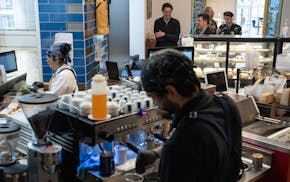Timberwolves fans will notice a new logo on the team's jersey when the NBA season begins in October.
The Timberwolves and the WNBA's Lynx have agreed to a multiyear corporate sponsorship deal with the Minneapolis-based buy-now-pay-later company Sezzle Inc., which includes the new jersey patch sponsorship.
Terms of the sponsorship deal were not disclosed.
The NBA's jersey patch program netted $150 million in revenue in its first five years between 2017 and 2022, but is now projected to bring in over $250 million annually across the league's 30 teams.
Deals are now landing in the range of $5 million to $20 million per year, with an average of $10 million expected for the 2024-2025 season, according to industry reports. The Wolves, whose revenue has risen from $183 million in 2021 to $288 million in 2023, are expected to earn near the average. The teams are owned by Glen Taylor, who also owns the Star Tribune.
"As that program has grown, the opportunities we've seen are based on impressions," said Wolves and Lynx Chief Operating Officer Ryan Tanke. "Companies are looking to scale their brands or create deeper impact with their customers. The jersey and all of the things around it become a really big opportunity for companies to align with sports teams."
The Wolves three-year jersey patch deal with Aura, an identity protection company in Boston, expired at the end of the last season. Fitbit, the electronics and fitness company owned by Google, was the team's first jersey patch partner, between 2017 and 2021.
Having a Minnesota company be the organization's next patch partner wasn't intentional for the Wolves, Tanke said.
"They're a fast-growing fintech company led by great people and I think they're also at an inflection point in their organization," Tanke said. "There was a ton of synergies as we got to know each other."
Plus, the two organizations have some connections. Sezzle co-founder Paul Paradis previously worked for the Wolves.
Sezzle, a publicly traded company, developed a digital platform that allows consumers to make installment payments on purchases from groceries to furniture. Sezzle reported $56 million in revenue and $29.7 million in net income for its recent second quarter. The company, founded in Minneapolis in 2017, generated $159.3 million in sales in 2023, up 27% over last year.
As of June 30, Sezzle had 2.6 million active customers in the U.S. and Canada. Placement on the Wolves jersey exposes Sezzle to millions of sports fans that could become potential users of its app.
A recent Nielsen survey found 40% of fans visited a brand's website after seeing the sponsorship. Nearly a third of them actually bought from the brand because of its attachment to sports, and almost 70% said they were more likely to remember a company name if it sponsors a sport they are interested in.
Matt Balvanz, head of analytics and innovation at Navigate, a Chicago-based sports and entertainment consulting firm, called the partnership "a pretty smart deal all around." The NBA recently signed a new television rights deal valued at $76 billion and the Wolves have one of the fastest-growing fan bases in the NBA due to its latest playoff run and popularity of star player Anthony Edwards, he said.
The team's fan base is also more likely to have disposable income to spend on brands affiliated with the Wolves, Balvanz said. After analyzing data from business intelligence firm GWI, Navigate determined Wolves fans are 36% more likely than the general U.S. population to have higher income and 51% more likely to describe themselves as tech confident.
And given the high concentration of credit unions, wealth management and banking service companies in Minnesota, Wolves fans are also 116% more likely to be a vice president or higher at a financial services firm.
"From Sezzle's perspective, they get to team up with an affluent fan base that saw 27% growth in Instagram followers last year to reach close to 4 million, and they also get the opportunity to secure new corporate accounts from the Wolves' existing sponsor portfolio of 75 large companies that no doubt have payment processing needs of their own," Balvanz said.
The deal will also help Sezzle build partnerships with retailers, said co-founder and Chief Executive Charlie Youakim. Sezzle earns income from fees paid by merchants in exchange for providing payment processing services. Merchant processing fees totaled $75.2 million for the company last year.
"Getting them to see the strength of the brand and being on a winning team like the Timberwolves helps us with opening doors on those types of conversations," he said.

Why now might be the best time to make a deal on boats, ATVs and other powersports

To reset downtown Minneapolis skyway life, building owners cut deals with retailers

Ramstad: AI is English-centric, but it's picking up Hmong quickly
Don't throw away perks that come with insurance and memberships

